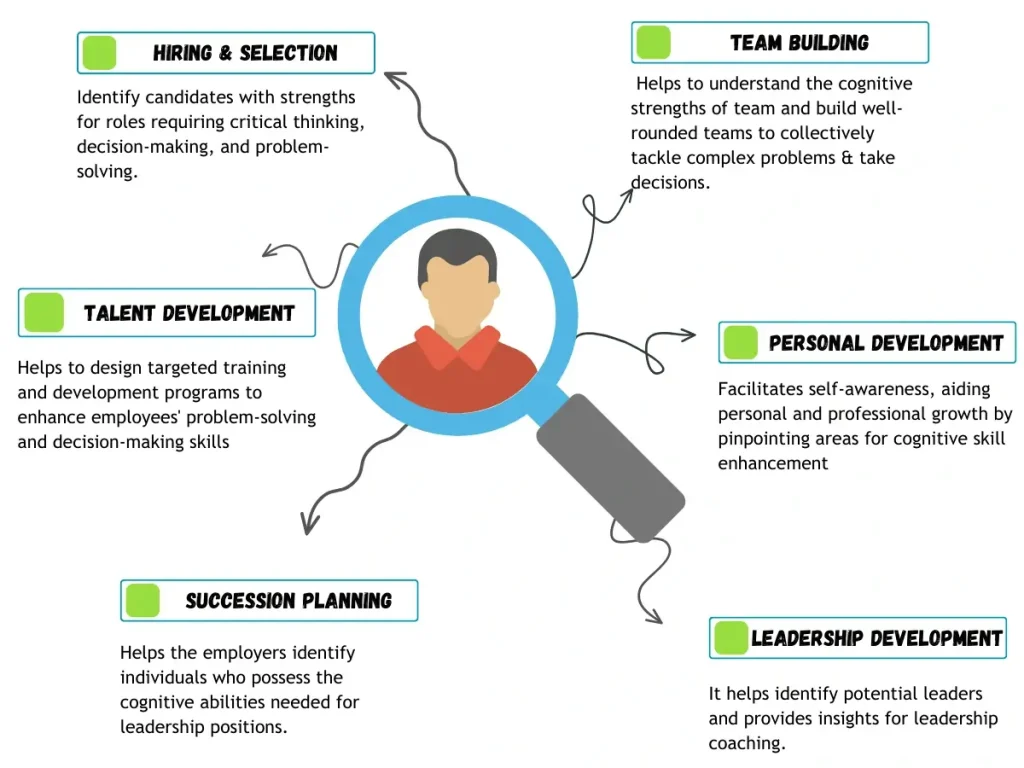Hogan Business Reasoning Inventory (HBRI) 2025: Free Practice Tests & Prep Course
- Overview
- Sample Questions
- Curriculum
- Instructor
Hogan’s Business Reasoning Inventory (HBRI) is more than just a test; it’s a gateway to career advancement and a tool employers rely on for making crucial hiring and development decisions. Whether you’re an aspiring manager, a job seeker, or even a seasoned executive, your HBRI score can be a game-changing asset in your professional journey. That’s where our comprehensive prep course comes in.
Our course is meticulously designed to give you a deep understanding of the HBRI’s structure, question types, and scoring system. We offer a wealth of practice questions modeled after the real HBRI test, along with detailed explanations and tips for success. So whether it’s numerical reasoning, verbal analysis, or logical thinking skills that you need to hone, we’ve got you covered.
Join us to gain a competitive edge with targeted preparation strategies and insider tips. Let’s work together to boost your HBRI score, and open new doors for your career!

HBRI Rapid Prep Course
Last Updated: Jan 07, 2025
Course Content
- 1IntroductionBuy this Course: Get full access to all lessons, practice tests and guides.
- 2Reading ComprehensionBuy this Course: Get full access to all lessons, practice tests and guides.
- 3Word AnalogiesBuy this Course: Get full access to all lessons, practice tests and guides.
- 4Writing AbilityBuy this Course: Get full access to all lessons, practice tests and guides.
- 5Basic MathBuy this Course: Get full access to all lessons, practice tests and guides.
- 6Word ProblemsBuy this Course: Get full access to all lessons, practice tests and guides.
- 7Number SeriesBuy this Course: Get full access to all lessons, practice tests and guides.
- 8Data VisualizationBuy this Course: Get full access to all lessons, practice tests and guides.
- 9Deductive ReasoningBuy this Course: Get full access to all lessons, practice tests and guides.
- 10Inductive ReasoningBuy this Course: Get full access to all lessons, practice tests and guides.
- 11Next in SeriesBuy this Course: Get full access to all lessons, practice tests and guides.
- 12Abstract AnalogiesBuy this Course: Get full access to all lessons, practice tests and guides.
- 13Odd One OutBuy this Course: Get full access to all lessons, practice tests and guides.
- 14MatricesBuy this Course: Get full access to all lessons, practice tests and guides.
- 15HBRI - Full Length Practice QuizBuy this Course: Get full access to all lessons, practice tests and guides.
What Is the HBRI and What Does It Measure?
The Hogan Business Reasoning Inventory (HBRI) is a test that lasts around 25 to 30 minutes. It’s created by Hogan Assessment Systems and plays a significant role in evaluating how individuals think during the hiring process More than just measuring knowledge, the HBRI dives deep into understanding an individual’s approach to problem-solving and decision-making in intricate business scenarios.
As the corporate world evolves, organizations globally are relying on HBRI to gain unparalleled insights into the cognitive strengths of their potential and existing talents, ensuring they have the right minds to navigate their unique challenges. At its core, the HBRI primarily evaluates:
- Quantitative Reasoning: This part tests how good you are with numbers. It looks at your skill in doing math problems and making decisions based on number information. This is important for jobs where you have to do things like budgeting or analyzing financial data.
- Qualitative Reasoning: This part tests how well you think using words and ideas instead of numbers. It looks at your ability to read and understand written materials. It also checks if you can think logically and make decisions without using number information.
This is important for jobs where you have to understand written documents and make choices based on them.
In sum, the HBRI isn’t just a test; it’s a trusted barometer for gauging cognitive abilities and potential in the demanding business world.
HBRI Application in Corporate Environment

HBRI Question Types & Format
The HBRI is designed to measure cognitive abilities that are important for effective business decision-making. This test includes a diverse range of question types, each designed to assess specific reasoning abilities in potential candidates. Here are the different topics covered in the test:
Numerical Reasoning
This checks how well someone can work with numbers and their skill in math and thinking. Tasks might include figuring out how much profit a product makes based on its cost and selling price or looking at a money report to see changes in earnings and costs. These skills are important for jobs that deal with money matters, planning budgets, and making decisions based on data.
Example of Numerical Reasoning Questions
A company conducted a survey among its employees to gather data on their job satisfaction levels. The results were recorded in the following table:
Job Satisfaction Survey Results
| Department | Highly Satisfied (%) | Satisfied (%) | Neutral (%) | Dissatisfied (%) |
|---|---|---|---|---|
| Marketing | 25% | 40% | 20% | 15% |
| Operations | 15% | 45% | 30% | 10% |
| Finance | 30% | 25% | 35% | 10% |
| Human Resources | 20% | 30% | 30% | 20% |
- A:
Marketing
- B:
Operations
- C:
Finance
- D:
Human Resources
Explanation:
Marketing: Highly Satisfied (%) + Satisfied (%) = 25% + 40% = 65%
Operations: Highly Satisfied (%) + Satisfied (%) = 15% + 45% = 60%
Finance: Highly Satisfied (%) + Satisfied (%) = 30% + 25% = 55%
Human Resources: Highly Satisfied (%) + Satisfied (%) = 20% + 30% = 50%
From the calculations, we can see that the Marketing department has the highest percentage of employees who are either highly satisfied or satisfied, with a combined percentage of 65%.
Therefore, the Marketing department has the highest percentage of employees who are either highly satisfied or satisfied, based on the data interpretation and analysis.
Verbal Reasoning
This looks at how well someone can understand and make sense of what they read. It measures how good they are at getting the meaning from written words and critically reviewing texts. Tasks might involve going through a detailed business report and answering questions about the main points or reviewing a written plan to see its good and bad sides. These skills are key for jobs that need strong communication and understanding of written information.
Examples of Verbal Reasoning Questions
- All members of the elite runners club can complete a marathon in under 3 hours.
- Some individuals who can complete a marathon in under 3 hours are not professionally trained.
- A:
All members of the elite runners club are professionally trained.
- B:
Some individuals who can complete a marathon in under 3 hours are not professionally trained.
- C:
No one can complete a marathon in under 3 hours without professional training.
- D:
Professional training guarantees completing a marathon in under 3 hours.
Explanation:
All members of the elite runners club can complete a marathon in under 3 hours.
Some individuals who can complete a marathon in under 3 hours are not professionally trained.
We are asked to make a valid inference based on these statements. Since all members of the elite runners club can complete a marathon in under 3 hours, it's clear that they are exceptionally fast runners. However, the second statement indicates that some individuals who can achieve this feat are not professionally trained, implying that natural talent or other factors can also contribute to their speed. Therefore, it would be incorrect to assume that all members of the elite runners club are professionally trained. The correct answer is option B, "Some individuals who can complete a marathon in under 3 hours are not professionally trained."
Abstract Reasoning
This tests how well someone can think in a unique way and solve problems without using words. It tests their skill in spotting patterns and links in things like drawings or designs. Tasks might involve finishing a series of shapes or finding out what piece is missing in a picture sequence. This kind of thinking is useful for jobs where creative problem-solving and seeing the bigger picture are important.
Examples of Abstract Reasoning Questions

- A:

- B:

- C:

- D:

- E:


Explanation:
Each step increases the number of dots in the square by arranging them in a square grid. The first step has 1 dot (1x1 grid), the second step has 4 dots (2x2 grid), the third step has 9 dots (3x3 grid), and the fourth step has 16 dots (4x4 grid). Following this pattern, the fifth step should have 25 dots (5x5 grid).
Preparing for the HBRI: Tips and Strategies
Here are some tips and tricks tailored specifically for the Hogan Business Reasoning Inventory (HBRI) to help you excel in the assessment:
Numerical Reasoning
- Understand the Basics: Start by understanding the fundamental concepts tested in numerical reasoning, such as percentages, ratios, and data interpretation.
- Practice Mental Math: Improve your mental math skills to quickly perform calculations without the need for a calculator. This can save you valuable time during the assessment.
- Prioritize Accuracy: While speed is important, accuracy is crucial. Double-check your calculations to minimize errors.
- Use Approximations: In time-sensitive situations, consider rounding numbers to simplify calculations and arrive at a close estimate.
- Review Graphs and Charts: Pay close attention to graphs and charts presented in the questions. They often contain valuable information that can help you answer correctly.
Verbal Reasoning
- Expand Vocabulary: A strong vocabulary is essential. Regularly read and learn new words to enhance your comprehension and interpretation of text.
- Identify Keywords: When reading passages, identify keywords and phrases that convey the main idea and key details. This will help you quickly grasp the context.
- Practice Reading Comprehension: Work on improving your reading speed and comprehension by practicing with a variety of texts, including newspapers, magazines, and academic articles.
- Eliminate Wrong Choices: When answering multiple-choice questions, start by eliminating clearly incorrect options. This narrows down your choices and increases your chances of selecting the correct answer.
- Context Clues: Pay attention to context clues within the passage that can provide hints about the meaning of unfamiliar words or phrases.
Abstract Reasoning
- Identify Patterns: Abstract reasoning often involves identifying patterns and relationships between shapes, symbols, or objects. Train your mind to recognize these patterns quickly.
- Practice with Timed Tests: Since abstract reasoning is often time-limited, practice under timed conditions to improve your speed and decision-making skills.
- Grouping and Classification: Understand how objects or shapes can be grouped or classified based on specific criteria. This is a common theme in abstract reasoning questions.
- Symmetry and Rotation: Pay attention to symmetry and rotation patterns. These are frequently tested in abstract reasoning assessments.
- Process of Elimination: If you’re unsure about an answer, use the process of elimination to rule out options that don’t fit the pattern or criteria.
Advantages of Our HBRI Prep Course
Comprehensive Question Bank: Our course offers a vast question bank comprising 120 Numerical Reasoning, 120 Verbal Reasoning, and 60 Abstract Reasoning questions. This extensive variety ensures you are well-prepared for a wide range of reasoning challenges.
Skill Enhancement: Through a mix of numerical, verbal, and abstract reasoning questions, participants can enhance their cognitive abilities across different domains, making them more adaptable problem solvers.
Timed and Untimed Quizzes: We understand that individuals have varying levels of familiarity with these reasoning types. Our course offers both timed and untimed quizzes, allowing you to practice at your own pace or under simulated exam conditions.
Realistic Test Simulation: Our timed quizzes provide a realistic simulation of assessment tests commonly used by employers, helping you develop the confidence and skills needed to excel in actual assessments.
Progress Tracking: Participants can track their progress over time, enabling them to identify areas where they excel and where they need more practice. This targeted approach is invaluable for improvement.
Expertly Crafted Questions: Our questions are meticulously designed to match the complexity and style of actual reasoning assessments. This ensures that you are well-prepared for any assessment thrown your way.
Flexibility and Accessibility: Access the course materials from anywhere and at any time. Our online platform ensures that you can practice and improve at your convenience.

Created by: Michael Learner
Psychometric Test Expert
253 students, 4.3, 23 Reviews
Hey, I’m Michael, PrepTerminal’s Business Reasoning expert. I am here to help you with any questions or concerns you may have about the Hogan Business Reasoning Inventory. Feel free to contact me at [email protected].

